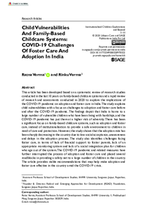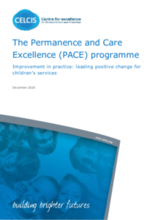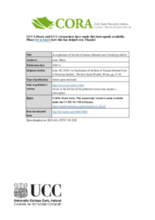Displaying 241 - 250 of 2221
This study examines whether increased interaction and observation of young children by school professionals leads to an increase in school-based reports to child welfare authorities and in the identification of child maltreatment victims.
This study examined the recurrent maltreatment of American Indian children in foster and adoptive homes, specifically the physical, emotional, sexual, and spiritual abuse subtypes, as well as poly-victimization of American Indian children in comparison to their White peers.
The present study focuses on experiences of relational tensions and management strategies in family relationships among 18 young adults with foster care backgrounds who participated in interviews.
With young people at the centre, this inquiry examines the needs and aspirations of young people leaving care and the capacity of the service system to respond to those needs and aspirations. The report makes 15 recommendation to enhance the service system’s capacity to improve the experiences and life outcomes for young people transitioning from care by responding to their needs, challenges and aspirations.
For this study, responses from 311 students in out‐of‐home care (OHC) were compared with peers living in birth parent care (BPC) and in single birth parent care (sBPC) in a regional school survey, directed to students in compulsory school eighth year and upper secondary school second year.
This article has been developed based on a systematic review of research studies conducted in the last 10 years on family-based childcare systems and a rapid review of research and assessments conducted in 2020 to explore the implications of the COVID-19 pandemic on adoption and foster care in India.
This qualitative study employed individual interviews to explore the emotional experiences of 15 adolescents placed in foster care.
This report provides an insight into the Permanence and Care Excellence (‘PACE’) programme – a Quality Improvement programme underway from 2014-2020 which engaged with local authority partnerships in 27 of the 32 Scottish local authority areas. The programme was aimed at supporting local authority partnerships across Scotland to reduce permanence planning timescales for looked after infants, children and young people using a Quality Improvement framework.
This paper explores the research from a collaborative between Tusla, the Child and Family Agency and University College Cork (UCC) that had an overarching aim to reduce fostering instability, in relation to its contribution to supporting fostering stability.
This study explored data obtained from surveys of caregivers who had previously adopted or assumed guardianship of a child from foster care in two U.S. states. Descriptive analyses summarized the demographic and wellbeing characteristics of children and families, and multivariate regression models estimated the association between these variables and caregiver commitment.




